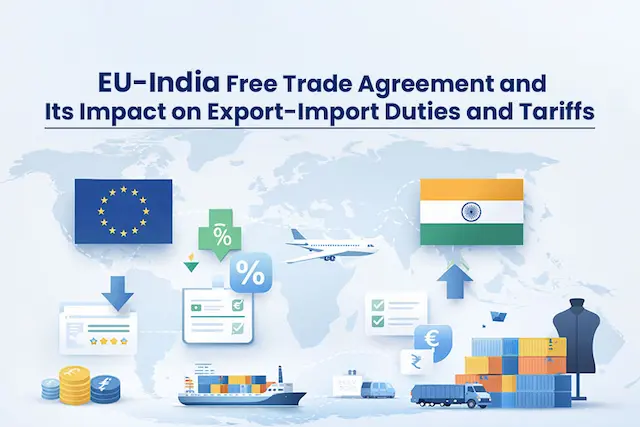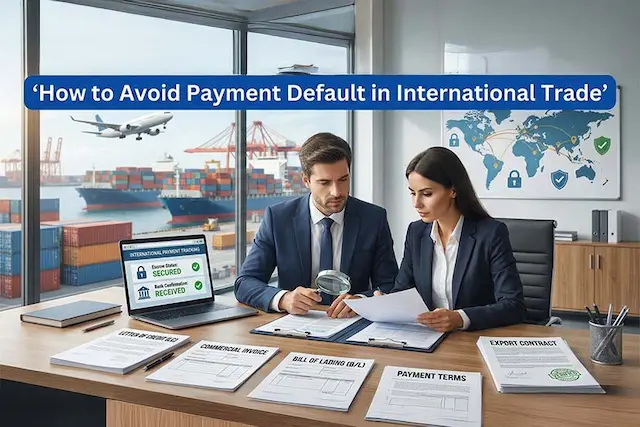Welcome to the world of global business, where Export Promotion Councils (EPCs) are your friendly companions. In this journey, we’ll explore the complete list, roles, and goals of these special groups, understanding how they help Indian businesses go global. Think of each council as a helpful tool, making opportunities accessible.
From learning about markets to simplifying rules, discover how EPCs make global success easy. Let’s uncover the simple yet important role of EPCs, where trade meets support, and success knows no boundaries. Join us as we delve into the uncomplicated world of EPCs, making global business a smooth and enjoyable ride.
What is Export Promotion?
Export promotion involves a range of activities aimed at assisting businesses in navigating the complexities of international trade. From identifying potential buyers and understanding market dynamics to accessing subsidies and incentives, the multifaceted process of exporting can be daunting for newcomers. The involvement of government bodies significantly influences a country’s export performance.
To alleviate challenges, industry bodies, particularly government-approved entities like Export Promotion Councils, play a pivotal role. These councils provide valuable assistance in various aspects of the export journey, offering guidance, information, and support to ensure that businesses can effectively engage in global trade. In essence, export promotion is about facilitating and enhancing a nation’s capacity to sell goods and services in the international market.
What is the Export Promotion Council?
Export Promotion Councils (EPCs) play a crucial role in helping businesses expand their reach globally. These are government-backed organizations that assist and encourage companies in boosting their international trade activities. The primary goal is to support exporters by offering valuable insights, technical assistance, and promoting government initiatives.
EPCs operate as non-profit entities, registered under relevant laws, and serve as a bridge between the government and the export industry. Their functions are twofold – advisory and executive.
On the advisory side, they provide guidance and information to export firms, helping them navigate the complexities of international trade. On the executive side, they actively promote the country’s goods and services abroad, contributing to the nation’s positive image as a reliable supplier of high-quality products.
One of the key roles of EPCs is to facilitate communication and collaboration between the government and export businesses. They serve as a channel for exporters to stay updated on policies and schemes, ensuring that they can take advantage of government support. Additionally, EPCs are instrumental in formulating foreign trade policies for the nation.
To streamline their efforts, EPCs are organized based on product categories. Each product has its dedicated Export Promotion Council, making it easier for businesses to align with the council relevant to their line of products.
Importantly, EPCs also focus on ensuring that exporters adhere to international standards and specifications. This not only enhances the quality of exported goods but also boosts the global reputation of the country as a whole.
Role of Export Promotion Councils
Here are some of the major roles of Export Promotion Councils:
Information Dissemination: Export Promotion Councils play a pivotal role in providing exporters with crucial information, aiding them in maximizing their export potential. They ensure that exporters are well-informed about government schemes and other benefits.
Data Collection: These councils gather export and import data from their members, creating a statistical foundation for analyzing industry growth. This data-driven approach helps in understanding market trends and dynamics.
International Trade Insights: Export Promotion Councils collect relevant data related to international trade, contributing to a comprehensive understanding of the global market landscape.
Trade Delegation Organization: To explore new opportunities and markets, EPCs organize trade delegations that enable businesses to connect with potential partners and customers in other countries.
Member Advisory Services: EPCs offer valuable advice to their members on various aspects such as technology adoption, quality control measures, and adherence to international standards and specifications.
Promotion of Business Events: Export Promotion Councils actively organize trade fairs, exhibitions, seminars, and meetings between buyers and sellers. These events serve as platforms for promoting businesses and facilitating networking.
Market Exploration: Through trade delegations and events, EPCs assist exporters in exploring new markets, creating avenues for business expansion and diversification.
Facilitating Technology Adoption: EPCs guide members on adopting relevant technologies, ensuring that businesses stay competitive in the global market.
Quality Assurance: Offering advice on quality control measures, Export Promotion Councils contribute to maintaining high standards in exported products, enhancing the country’s global reputation.
Communication Catalysts: EPCs foster effective communication between the export business community and the government, ensuring that the needs and concerns of exporters are conveyed and addressed appropriately.
What are the Benefits of the Export Promotion Council?
Here are some of the benefits of the export promotion council:
Market Access: Export Promotion Councils (EPCs) facilitate market access for businesses by providing information on international markets, helping them identify potential buyers and opportunities.
Government Support: EPCs act as intermediaries between exporters and government bodies, ensuring that businesses are informed about and can avail themselves of various subsidies, incentives, and schemes.
Networking Opportunities: EPCs organize trade delegations, fairs, and events, fostering networking opportunities for exporters to connect with potential partners and buyers from around the world.
Data and Research: EPCs collect and provide relevant data and research on global market trends, enabling exporters to make informed decisions and adapt to changing market conditions.
Quality Standards: EPCs guide exporters on adhering to international quality standards, enhancing the competitiveness of their products in the global market.
Technology Adoption: EPCs offer advice on adopting advanced technologies, helping businesses stay innovative and competitive in the international marketplace.
Industry Representation: EPCs represent the interests of their specific industries, advocating for policies that benefit exporters and addressing industry-specific challenges.
Capacity Building: EPCs contribute to the overall capacity building of exporters by providing training, workshops, and resources, empowering them to navigate the complexities of international trade successfully.
Example: The Electronic Bank Reconciliation Certificate initiative by the Directorate General of Foreign Trade (DGFT) streamlines the process for exporters in India. This innovative system, detailed in the full article [link], collaborates with various Export Promotion Councils (EPCs). It enables exporters to automatically provide bank statements as evidence to the government, facilitating the seamless utilization of numerous benefits. The collaborative effort between DGFT and EPCs underscores the importance of industry consultation in developing effective tools that simplify procedures for exporters, promoting efficiency and enhancing the overall export ecosystem in India.
Export Promotion Councils of India Full List
Here’s a full list of export promotion councils of India:
EEPC India (Engineering Export Promotion Council): Dedicated to promoting and advancing the export of engineering goods, EEPC India plays a crucial role in supporting the global competitiveness of the Indian engineering industry.
Project Exports Promotion Council of India (PEPC): PEPC focuses on facilitating the export of civil and engineering projects, contributing to the growth and global outreach of the Indian project export sector.
Basic Chemicals, Pharmaceuticals and Cosmetics Export Promotion Council (Chemexcil): Chemexcil promotes the export of basic chemicals, pharmaceuticals, and cosmetics, working towards enhancing the international presence of the Indian chemical and pharmaceutical industry.
Chemicals and Allied Products Export Promotion Council (CAPEXIL): CAPEXIL supports the export of a wide range of chemicals and allied products, playing a vital role in fostering global trade for the Indian chemical industry.
Council for Leather Exports: Focused on the export of leather and leather goods, this council works to boost the international market presence of the Indian leather industry, emphasizing quality and design.
Sports Goods Export Promotion Council: This council is dedicated to promoting the export of sports goods, facilitating market access for Indian manufacturers in the global sports equipment industry.
Gem and Jewellery Export Promotion Council (GJEPC): GJEPC plays a key role in promoting the export of gems and jewelry, contributing significantly to India’s reputation as a major player in the global jewelry market.
Shellac Export Promotion Council: Focused on the export of vegetable saps and extracts, this council works to enhance the global reach of Indian shellac and related products.
Cashew Export Promotion Council of India: Dedicated to the export of cashews and cashew-based products, this council supports the Indian cashew industry in expanding its market share internationally.
The Plastics Export Promotion Council: This council promotes and facilitates the export of plastic and plastic goods, contributing to the global presence of the Indian plastics industry.
Export Promotion Council for EOUs & SEZ Units (EPCES): EPCES is involved in promoting and supporting the export activities of units operating in Export Oriented Units (EOUs) and Special Economic Zones (SEZs), enhancing their competitiveness on the global stage.
Pharmaceutical Export Promotion Council: Focused on the export of pharmaceutical products, this council plays a crucial role in facilitating international trade for the Indian pharmaceutical industry.
Indian Oilseeds & Produce Export Promotion Council (IOPEPC): IOPEPC works towards promoting the export of Indian oilseeds and related products, contributing to the global trade in edible oils and oilseed products.
Services Export Promotion Council: This council focuses on promoting and supporting the export of services, recognizing the growing importance of the service sector in India’s global trade landscape.
Registration Procedure of Export Promotion Council

The registration procedure for an Export Promotion Council (EPC) involves several steps to ensure that businesses can benefit from the services and support provided by these councils. While specific details may vary, here is a general outline of the registration process:
Eligibility Check: Businesses need to determine if they fall under the purview of a specific EPC based on their product or industry.
Documentation: Prepare the necessary documentation, which may include details about the business, its products, and compliance with relevant regulations.
Application Submission: Submit the completed application form along with the required documents to the respective EPC.
Review and Verification: The EPC reviews the application to ensure that the business aligns with the council’s objectives and criteria.
Approval and Registration: Upon successful verification, the EPC approves the application, and the business becomes a registered member of the Export Promotion Council.
Membership Fees: Some EPCs may require payment of membership fees. Ensure that any applicable fees are paid according to the council’s guidelines.
Access to Services: Registered businesses gain access to various services offered by the EPC, including market information, trade promotion activities, and assistance with export-related challenges.
Compliance: Maintain compliance with the EPC’s rules and regulations to continue benefiting from their services and support.
It’s essential for businesses to check the specific requirements and procedures of the relevant Export Promotion Council, as they may vary based on the industry and the council’s guidelines. Additionally, staying engaged with the EPC and actively participating in their programs can maximize the benefits derived from the registration.
Essential Documents for Registering with an Export Promotion Council
Embarking on the journey of international trade through an Export Promotion Council (EPC) requires meticulous documentation. To streamline the registration process, gather the following key documents:
- Digital Signature Certificate: Secure a digital signature certificate to authenticate electronic documents, ensuring the security and integrity of your online transactions.
- Copy of IEC Code Certificate: Include a copy of the Importer-Exporter Code (IEC) certificate, a fundamental requirement for engaging in cross-border trade.
- CA-Certified Export Turnover Figure: Obtain a certificate from a Chartered Accountant verifying the export turnover figure (FOB value in Rupees), a crucial financial validation for EPC registration.
- List of Partners/Directors: Provide a comprehensive list of partners/directors along with their residential addresses, offering transparency and accountability in business operations.
- MSME Registration Certificate (if available): If applicable, furnish the MSME registration certificate, demonstrating your business’s status and potentially unlocking additional benefits.
Ensuring the completeness and accuracy of these documents not only expedites the registration process but also positions your business for a successful and fruitful association with the Export Promotion Council.
Export Success: 7 Pro Tips for Businesses
Here are some good tips to keep in the back of your mind:
Unlock Government Benefits with RCMC: While you can export without a Registration-cum-Membership Certificate (RCMC), obtaining one ensures access to quality certificates and other government advantages. Be mindful of specific export activities where RCMC is indispensable.
Northeastern Advantage for Multi-Item Exporters: For multi-item exporters with a head office in northeastern states, consider acquiring RCMC from the Shellac and Forest Products Export Promotion Council, with a few exceptions.
Maximize Government Schemes: Dive deep into the Market Access Initiative and Marketing Development Assistance schemes offered by your Export Promotion Council (EPC). Understanding and leveraging these schemes can significantly contribute to business growth and expansion into new markets.
Stay Informed: Keep yourself updated on the latest regulations and market trends. Continuous learning ensures you make informed decisions, navigate challenges effectively, and stay competitive in the global market.
Explore New Geographies: Utilize the resources provided by your EPC to explore new geographies and markets. These initiatives can open doors to fresh opportunities and expand the reach of your exports.
Networking is Key: Actively participate in trade delegations, seminars, and industry events organized by your EPC. Networking with fellow exporters and industry experts can lead to valuable collaborations and insights.
Optimize Market Access and Growth: Leverage the expertise of your EPC to optimize market access and fuel the growth of your exports. Tap into their knowledge base and support services to navigate international trade successfully.
Export Compliance: 5 Crucial Warnings for Businesses (H2)
Here are some warning signs to keep in the back of your mind:
Multi-Product Registration Caution: When opting for multi-product registration with FIEO, ensure thorough inquiry with your relevant Export Promotion Council (EPC) for any additional requirements. Overlooking specific registration details may lead to complications.
EPC Restructuring Alert: Stay vigilant by regularly checking in with your EPC, as some may undergo closure or restructuring during the planned government review of Export Promotion Councils. Stay informed to adapt to any changes in your EPC’s status.
Timely Membership Fee Payments: Avoid the risk of deregistration from your Registration-cum-Membership Certificate (RCMC) by ensuring prompt payment of membership fees. Delays may result in loss of privileges and benefits associated with the RCMC.
Adherence to Regulatory Reviews: Stay attuned to regulatory changes and government reviews affecting export-related entities. Proactively respond to any adjustments in policies or procedures to maintain compliance and continuity in your export activities.
Communication is Key: Establish a proactive communication channel with your EPC to stay abreast of any updates, requirements, or changes in processes. Regular dialogue ensures that you are well-informed and can navigate potential challenges effectively.
Final Words
Embarking on global trade may seem complex, but Export Promotion Councils (EPCs) are here to help. These councils, like friendly guides, provide support, tips, and important warnings to make your export journey smooth. Remember to stay updated on market trends, explore new markets with EPCs, and follow their advice for success.
Don’t forget timely payments and communication with your EPC for a strong partnership. With EPCs by your side, navigating the global marketplace becomes easier, ensuring your business can grow and thrive in the exciting world of international trade.
Also Read : How To Start Import Export Business In India: The Complete Guide




